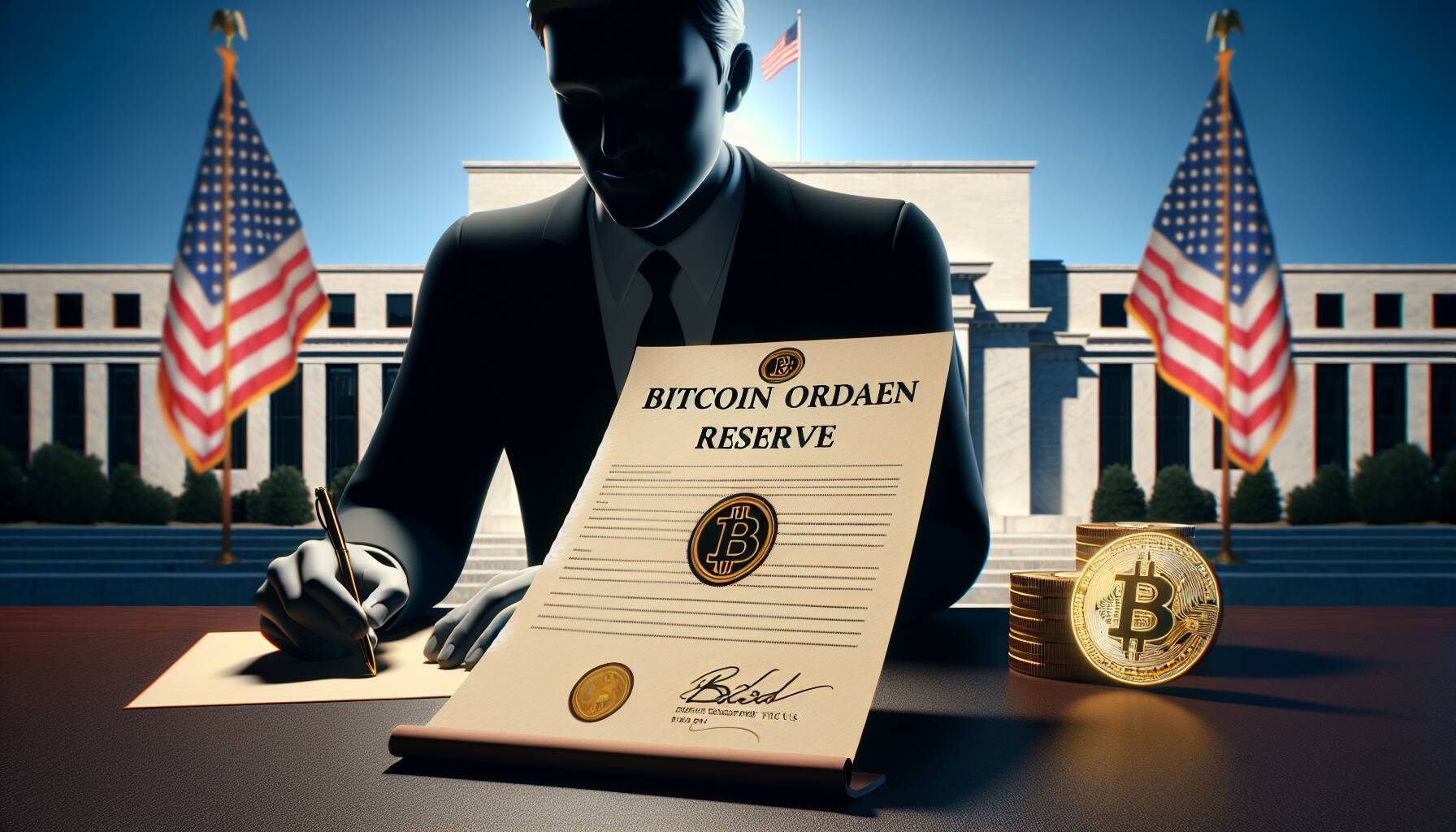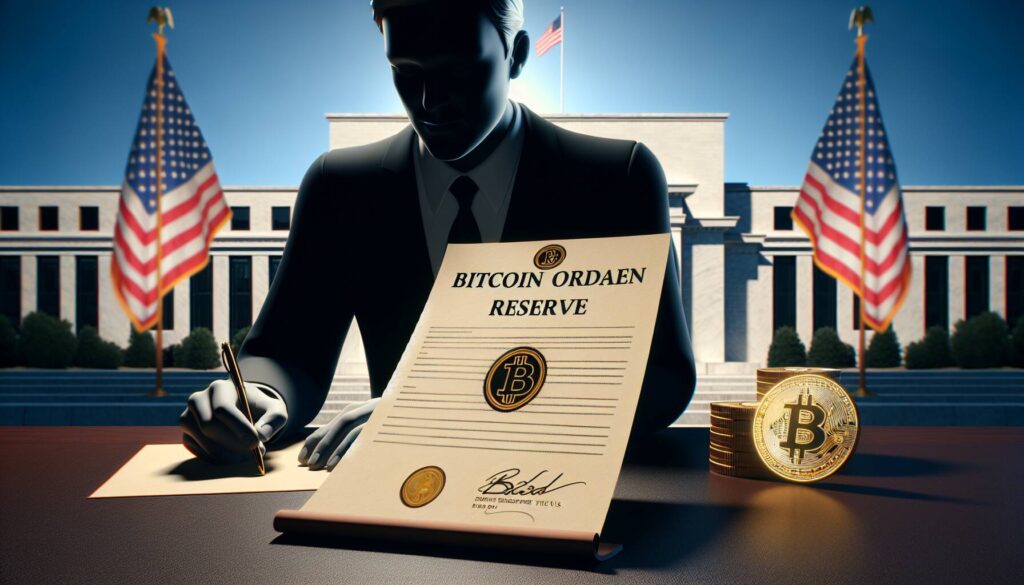In a groundbreaking move, President Donald Trump has signed an executive order aimed at establishing a Bitcoin (BTC) reserve, positioning the original cryptocurrency as a key asset in the U.S. government’s financial portfolio. According to a senior White House official, this directive recognizes Bitcoin as deserving of special status, significantly distinguishing it from other cryptocurrencies. The initial phase of this ambitious venture will see the government embrace approximately 200,000 Bitcoin currently in its possession, which were obtained through seizures linked to criminal and civil cases.
The announcement coincides with a high-profile crypto summit at the White House, where industry leaders from prominent firms such as Coinbase, Ripple, and Kraken are gathering for discussions on policy and collaboration with the Trump administration. Trump’s presence is anticipated as he highlights the significance of his executive order, indicating a shift in the federal government’s approach to cryptocurrency.
“The White House maintains that a lack of foresight about holding on to previously seized crypto has cost the U.S. about billion.”
Intriguingly, this newly established reserve may not initially involve active investment strategies or taxpayer funds, as officials explore alternative methods of capital introduction. A comprehensive audit is also underway to ascertain the complete extent of the government’s cryptocurrency holdings, which will feed into the reserve. While the proposal has generated excitement about integrating digital assets into the U.S. economy, there are indicators of disappointment among observers regarding the absence of an active purchase program for the reserve at this time.
Moreover, the upcoming summit reflects a notable turnaround for the cryptocurrency landscape in the U.S., moving away from the tumultuous narrative following the industry’s challenges in 2022. The Republican-led Congress has shown an increased willingness to support cryptocurrency initiatives, as evidenced by a recent Senate vote aiming to eliminate unfavorable tax regulations imposed during the previous administration. This evolving landscape suggests a more welcoming environment for cryptocurrency in U.S. policy discussions.
In summary, Trump’s Bitcoin reserve initiative represents a significant step toward integrating digital currencies within the framework of U.S. financial mechanisms, signaling both a new direction for governmental engagement with the crypto sector and future conversations about its role in the economy.

Establishment of Bitcoin Reserve in the U.S.
Key points regarding President Donald Trump’s executive order for a bitcoin reserve and its potential impact:
- Bitcoin Reserve Creation: An executive order has been signed to establish a bitcoin reserve as a U.S. reserve asset.
- Initial Stockpile: The reserve will begin with approximately 200,000 bitcoin currently held by the U.S. government.
- Special Treatment: Bitcoin aims to receive special treatment, distinguishing it from other cryptocurrency assets.
- Government Audit: The federal government will conduct an audit to determine the total amount of crypto held and moving it to the new reserve.
- Crypto Summit: A crypto summit will gather industry leaders to discuss policies with the Trump administration.
- Investment Plans: Future investment in the bitcoin reserve may occur, depending on new funding opportunities without relying on taxpayers.
- Legislative Action Needed: The executive order is not permanent, and further legislation would be required to solidify the reserve.
- Impact of Previous Policies: The White House claims past mismanagement of seized crypto assets has cost the U.S. government about billion.
- Crypto Market Response: The newly supportive environment for crypto reflects a significant change from the previous administration’s policies.
- Tax Issues Absent: Tax issues, although anticipated, will not be addressed at the summit, focusing instead on the administration’s intentions.
The establishment of a bitcoin reserve could potentially change how cryptocurrency is perceived and regulated in the U.S., impacting individual investors and the broader market.
The implications of this executive order could resonate with readers as it indicates a shift towards recognizing cryptocurrency’s value and stability on a national level.
- Potential for increased investor confidence in bitcoin and the crypto market.
- Possible changes in regulatory frameworks that could either hinder or facilitate crypto investment.
- Impact on individual tax liabilities if legislative changes occur concerning crypto taxation.
- Influence of industry leaders’ feedback on future policies, affecting how cryptocurrencies are integrated into the economy.
Trump’s Bitcoin Reserve: A New Era for Cryptocurrency or Just a Political Play?
In a surprising move, President Trump has initiated the establishment of a bitcoin reserve in the United States, which he envisions as a foundational asset to legitimize cryptocurrency at a governmental level. This action signifies a notable shift in the U.S. administration’s attitude towards cryptocurrency, particularly in light of the tumultuous events of 2022 that saw a plunge in confidence within the industry. By positioning bitcoin as a central, protected reserve asset, the administration is attempting to not only recoup perceived losses but also to legitimize digital currencies considerably.
Competitive Advantages: One of the most prominent advantages of this initiative is the potential for increased legitimacy and acceptance of bitcoin and cryptocurrencies within traditional financial systems. By officially recognizing bitcoin as a reserve asset, it could catalyze institutional investment, ushering in a new era of financial integration for cryptocurrencies. The move could position the U.S. ahead of other nations in terms of crypto regulation and adoption, serving as a beacon of innovation and financial strategy in an increasingly competitive global market.
In addition, the government’s acknowledgment of bitcoin’s decentralized nature and its limited supply could resonate well with investors looking for stability, acting as an anchor for those wary of volatility in digital markets. This may also appeal to libertarian-minded individuals and investors, enhancing Trump’s support among those who value financial independence.
Disadvantages: However, there are significant concerns surrounding the initiative. By basing the reserve on seized assets, the process raises questions about ethical considerations and transparency. Critics worry that relying on confiscated crypto could paint the government in a negative light, as it may be perceived as predatory or oppressive, particularly among civil libertarians. Furthermore, the lack of an active buying program means the reserve could stagnate, which could ultimately yield disappointing returns compared to more dynamic investment strategies adopted by private entities.
The political implications might also pose challenges. Given the executive order nature of this decision, it remains vulnerable to reversals by subsequent administrations, leaving investors with uncertainty. The summit’s convivial atmosphere could mislead stakeholders into believing the policy is more robust than it truly is, raising the risk of disillusionment in the future.
This development could significantly benefit investors, traders, and businesses involved in cryptocurrencies, bolstering market confidence and potentially stimulating growth in allied sectors, such as blockchain technology and digital asset management. Conversely, traditional financial institutions and regulatory entities that prioritize stringent oversight and caution concerning cryptocurrencies might perceive this leniency as a threat, triggering opposition within legislative chambers and leading to calls for more regulation, thereby complicating the landscape for crypto investors.














